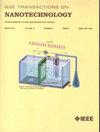基于 VS2 的超级电容器电极的温度稳定量子电容的 DFT 计算
IF 2.1
4区 工程技术
Q3 ENGINEERING, ELECTRICAL & ELECTRONIC
引用次数: 0
摘要
通过密度泛函理论计算,我们证明了 VS2 电极的量子电容可以通过掺杂氮(N)、磷(P)和砷(As)原子等非金属元素得到改善。这些非金属元素的半径、电荷和形态有助于提高 VS2 材料作为超级电容器电极的性能。砷掺杂的 VS2 单层材料在 300 K 时的最大量子电容为 31.2369 μF/cm2;在 1200 K 时,量子电容值达到 25.2149 μF/cm2,表明在这一较宽的温度变化范围内量子电容值变化不大。此外,还计算并详细研究了未掺杂和掺杂 VS2 单层的其他重要特性,如态密度、能带结构、电导率、热导率和塞贝克系数。P 和掺砷 VS2 单层的能带结构显示出金属性质,适合电极应用。对于掺砷的 VS2 材料,由于其具有较大的塞贝克系数和显著的导电性,通过 DFT-D2 计算观察到了 3.536 的高优点系数。我们的研究结果将有助于进一步探索 VS2 单层材料作为超级电容器电极的适用性。本文章由计算机程序翻译,如有差异,请以英文原文为准。
DFT Calculations for Temperature Stable Quantum Capacitance of VS2 Based Electrodes for Supercapacitors
Using density functional theory calculations, we demonstrate the quantum capacitance of the VS
2
electrode which can be improved by doping with non-metallic elements such as nitrogen (N), phosphorus (P), and arsenic (As) atoms. The radius, charge, and morphology of these non-metallic elements help to improve the performance of VS
2
material as electrodes of supercapacitors. The As-doped VS
2
monolayer demonstrated the maximum quantum capacitance of 31.2369 μF/cm
2
at 300 K. At 1200 K, quantum capacitance reaches the value of 25.2149 μF/cm
2
, showing the inconsiderable change in value for this wide range of temperature variation. Additionally, the other important properties of undoped and doped VS
2
monolayers such as density of states, energy band structure, electrical conductivity, thermal conductivity, and the Seebeck coefficient were also computed and examined in detail. The band structure of the P and As-doped VS
2
monolayers showed a metallic nature, which is suitable for electrode application. In the case of As-doped VS
2
material, a high figure of merit of 3.536 was observed by using DFT-D2 calculations, due to the large Seebeck coefficient and significant electrical conductivity. Our findings will be helpful in further exploring the suitability of VS
2
monolayers as electrodes of supercapacitors.
求助全文
通过发布文献求助,成功后即可免费获取论文全文。
去求助
来源期刊

IEEE Transactions on Nanotechnology
工程技术-材料科学:综合
CiteScore
4.80
自引率
8.30%
发文量
74
审稿时长
8.3 months
期刊介绍:
The IEEE Transactions on Nanotechnology is devoted to the publication of manuscripts of archival value in the general area of nanotechnology, which is rapidly emerging as one of the fastest growing and most promising new technological developments for the next generation and beyond.
 求助内容:
求助内容: 应助结果提醒方式:
应助结果提醒方式:


